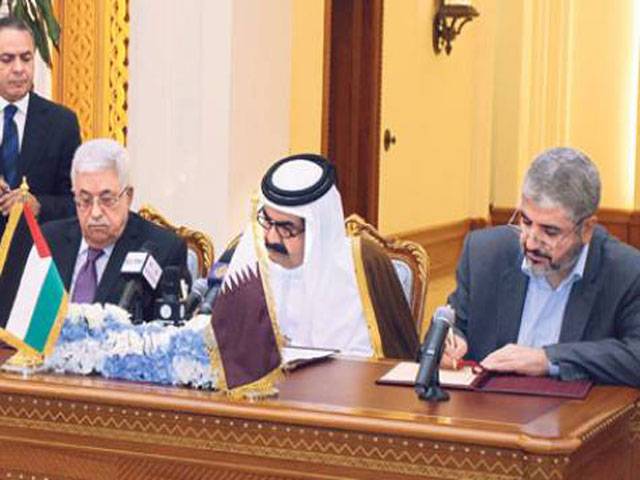Good news associated with the Palestinians is very hard to come by these days, but February 6 was an exception. A Qatari initiative succeeded in bringing together two bitter rivals in Doha; Palestinian President and Fatah leader Mahmoud Abbas and head of Hamas’ political bureau Khalid Mesha’al. The Doha Declaration represented the biggest leap forward on the road to securing Palestinian reconciliation.
Under the agreement Abbas will head an interim unity government that will oversee legislative and presidential elections. The agreement stipulates that work will intensify to overhaul the Palestine Liberation Organisation (PLO), which Hamas will join, leading to a new Palestine National Council (PNC), the highest Palestinian body representing all Palestinians.
Also the two sides agreed to work through committees to end issues relating to detainees, Gaza reconstruction, restructuring of Palestinian institutions and others. The next time both sides will meet it will be in Cairo on February 18 during which the new government will be announced.
Efforts to end the Palestinian rift and bring about reconciliation have been on and off since 2006, when Fatah and PNA officials were chased out of Gaza. All previous attempts have ended in failure because the two sides never trusted each other. But that is not the only reason.
US and Israeli pressure on Abbas not to go ahead with reconciliation initiatives has prevented a successful conclusion of negotiations. Hamas too was careful not to antagonise its allies in Damascus and Tehran. Palestinian reconciliation was tossed around like a regional football but this time there are encouraging signs that both sides have a vested interest in pulling it through.
Game changer
The Arab Spring has toppled a key regional player, former Egyptian president Hosni Mubarak, who had special ties with both the PNA and Hamas. But few believed that he conducted the role of intermediary as an honest broker. His regime helped impose a siege on the Gaza Strip, often denying the passage of humanitarian aid to Gazans who were trying to recover from a vicious onslaught by Israel in 2009. A number of Hamas leaders were arrested or harassed as they crossed into Egypt.
With Mubarak out of the way, Hamas’ relations with Egypt witnessed a dramatic change. Its leaders are now able to use the Rafah border at anytime while Cairo’s new military leaders have kept it open for humanitarian uses. Moreover, Abbas has been greatly disappointed by the Obama administration which has failed to convince Israel to restart the negotiations and halt colony activities.
For Hamas, whose leaders have been hosted by the Damascus regime for years, the Syrian uprising has been a game changer. Mesha’al has refused to throw his support behind the Bashar Al Assad regime and as a result has been quietly disassociating himself from Damascus. The movement’s leadership has been looking for new homes in Doha, Amman and Gaza. Furthermore, Mesha’al has expressed admiration for the Arab Spring believing that non-violent popular uprisings are the way forward in the Occupied Territories. He has been distancing himself from Tehran and hoping to gain recognition in Europe and elsewhere. Hamas does not recognise Israel but it has accepted a deal in which an independent Palestinian state is recognised within the pre-1967 war borders.
In addition to that Hamas has been thrilled by the success of fellow Sunni Islamist movements in Egypt, Tunisia and Morocco. US willingness to open dialogue with the Muslim Brotherhood, of which Hamas is an ideological relative, has given hope to Mesha’al that the time could come when his movement could be recognised as a major player in the Palestinian issue.
Hamas’ way to reach such goals will have to start with Palestinian reconciliation. Abbas is hoping to strengthen his hand in any future negotiations although his new rapport with Hamas has been criticised by Israeli Prime Minister Benjamin Netanyahu who said that the Palestinian leader has chosen to abandon the path of peace.
Interestingly, the initial US reaction to the Doha Declaration was less critical. Washington described the deal as an internal Palestinian issue. But Abbas knows that many pro-Israel Congressmen will use the new deal as a pretext to deny PNA much needed funds. It is here that the Palestinians would need all the Arab and European help they could get.
The road to the February 18 deadline is difficult. Abbas will come under US and Israeli pressure to abandon the deal. Hamas too will have to recognise that its iron-fist rule of Gaza must come to an end if free and open elections will come next. For the time being the Palestinian people have a good reason to be joyful. The rift has cost them many opportunities and allowed Israel to pursue plans to colonise Palestinian land.
If the reconciliation is successful and a new era begins the Palestinians can hope to direct their attention to Israeli violations which have destroyed hopes for a two-state solution.
Osama Al Sharif is a journalist and political commentator based in Amman –Gulf News
Sunday, May 19, 2024
Reconciliation deal can succeed

6:54 PM | May 18, 2024
NEPRA’s Neglect
May 19, 2024
Slovak PM shooting: Suspect in detention
May 19, 2024
Flash floods kill 50 in Afghanistan
May 19, 2024
Sports & Genocide
May 18, 2024
Healing AJK
May 18, 2024
A New World Order
May 18, 2024
Tobacco Toll
May 17, 2024
Rushed Reforms
May 17, 2024
Continuing Narrative of Nakba
May 18, 2024
Teacher Struggles
May 18, 2024
No Filers out of Reach
May 18, 2024
Hoax of Inflation Coming Down
May 17, 2024
Rising Inflation
May 17, 2024
ePaper - Nawaiwaqt
Advertisement
Nawaiwaqt Group | Copyright © 2024





